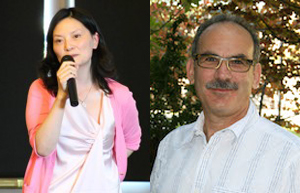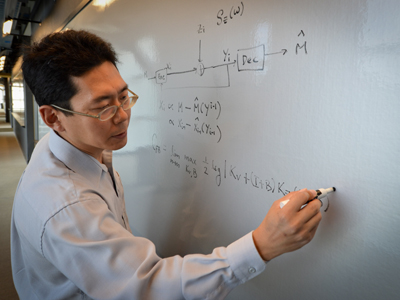News Release
Two UC San Diego Computer Scientists, One Electrical Engineer Named IEEE Fellows
 |
| CSE professors Yuanyuan Zhou (left) and David Kriegman |
San Diego, CA, December 1, 2014 -- Three members of the Jacobs School of Engineering faculty at the University of California, San Diego have been elevated to be Fellows in the Institute of Electrical and Electronics Engineers (IEEE). Computer Science and Engineering (CSE) Prof. David Kriegman was honored for his contributions to computer vision, and CSE Prof. Yuanyuan (YY) Zhou was cited for her “contributions to scalable algorithms and tools for computer reliability.” Electrical and Computer Engineering (ECE) Prof. Young-Han Kim was honored for his contributions to feedback communication and network information theory. All three faculty members are also affiliated with the Qualcomm Institute.
Following a rigorous, annual evaluation procedure, the IEEE Fellow Committee recommends a select group of recipients for elevation to IEEE Fellow. Less than one-tenth of one percent of voting members are selected annually for elevation to the highest member grade. At its meeting in November, the IEEE Board of Directors approved Fellow status for 300 researchers worldwide, effective January 1, 2015.
|
|
| ECE's Young-Han Kim |
Kriegman and Zhou join an elite contingent of CSE faculty to be named Fellows of IEEE. They will join seven current or emeritus professors including Walter Burkhard and CK Cheng (both in 2000), William Howden (2001), CSE chair Rajesh Gupta (2004), Jeanne Ferrante (2005), Dean Tullsen (2009) and Andrew Kahng (2010). Former CSE professors also elevated to IEEE Fellow status included Francine Berman (2011), Andrew Chien (2007) and Larry Carter (2000).
In addition to CSE’s Kriegman and Zhou and ECE’s Kim, the 2015 class of IEEE Fellows includes a fourth UC San Diego professor, Tzyy-Ping Jung, associate director of the Swartz Center for Computational Neuroscience in the Institute of Neural Computation (INC). Jung, who was cited for his contributions to blind source separation for biomedical applications, is also a member of the UC San Diego Center for Wearable Sensors.
YY Zhou
|
|
| CSE Prof. YY Zhou speaks at the department's 25th anniversary |
Professor YY Zhou is one of only a handful of current CSE faculty who have achieved fellowship status in both IEEE and the Association for Computing Machinery (ACM). She became an ACM Fellow in 2013. Zhou is the inaugural holder of the Qualcomm Endowed Chair in Mobile Systems, which she assumed when she joined the CSE faculty in 2009. Prior to UC San Diego, she was on the faculty at the University of Illinois at Urbana-Champaign from 2002 to 2009. Zhou earned her Ph.D. from Princeton University in 2000, after completing her M.A. in computer science (also at Princeton) in 1996, and B.S. in computer science from Beijing University in 1992. Zhou’s many past honors have included an Alfred Sloan Fellowship (in 2007), NSF Career Award (2004), CRA-W Anita Borg Early Career Award (2005), DOE Early Career Principal Investigator Award (2005), and IBM Faculty Awards (2004 and 2005). Prior to UIUC, Zhou worked at NEC Lab and co-founded a storage startup, Emphora. In 2006, she also co-founded and remains CTO of Pattern Insight (which sold its Log Insight business to VMware in 2012), and more recently launched her third startup, Whova, which developed a mobile app for large events (including, recently, TEDxSanDiego and the Trillion Sensors Summit).
In addition to software dependability (for which she was cited by IEEE), Zhou’s current research includes mobile software reliability and data center configuration management. “As rapid advances in computing hardware have led to dramatic improvement in computer performance, the issues of reliability, availability, maintainability, and cost of ownership are becoming increasingly important,” says Zhou. “My research aims to address these challenge issues in designing the next generation of computing systems.”
David Kriegman
Like Zhou, David Kriegman was teaching at UIUC prior to joining the UC San Diego faculty in September 2002. He received his Ph.D. in 1989 from Stanford University, taught at Yale University from 1990 to 1998 (when he also won a prestigious NSF Young Investigator Award in 1992), and was on the Computer Science faculty and the Beckman Institute at UIUC from 1998 to 2002. Kriegman was also a visiting professor at Caltech in the summers of 1993 and 1994. He was the Editor-in-Chief of the IEEE Transactions on Pattern Analysis and Machine Intelligence from 2005 to 2008, the leading journal in his field. Kriegman co-founded two companies, TAAZ Inc. and Kriegman-Belhumeur Vision Technologies (KBVT). KBVT was acquired by Dropbox this year and TAAZ received the CONNECT Most Innovative New Product Award in 2008. Dr. Kriegman is also involved with Sight Commerce, which generates hundreds of millions of images each month to help retailers inspire their consumers, understand their shopping preferences and increase sales by building confidence in the consumer's purchase decision.
Professor Kriegman is one of the most widely cited experts on the subject of face recognition, a crucial component of vision-based security systems for human-computer interaction as well as homeland security purposes. For his research on recognizing objects under illumination extremes and for reconstructing surface shape from lighting variation, he won Best Paper awards in the U.S. and Europe. In turn, he has introduced new methods to render photorealistic images through image-based modeling of surface reflectance. He has applied his research methods to understanding human perception, robotic perception and navigation, computer graphics, and electron microscopy. With the significant decline of coral reefs due to global climate change, the Computer Vision Coral Ecology project with the Scripps Institution of Oceanography has developed CoralNet to analyze photos of coral reefs automatically.
Young-Han Kim
|
|
|
Young-Han Kim is a professor of Electrical and Computer |
Electrical engineering Prof. Young-Han Kim’s research has addressed new challenges that have arisen in the evolution of communication networks. Through an investigation of new paradigms of interactive feedback communication over networks, as well as the development of a common set of conceptual, mathematical, and algorithmic tools for the emerging convergence of computation, control, and communication over networks, Professor Kim has provided the scientific and engineering community with a deeper understanding and capability in these areas.
With over a dozen journal publications and co-authorship of a comprehensive text concerning Network Information Theory,Young-Han has become a leading academic in his field. Professor Kim has received an array of awards and honors for his research, including the 2008 NSF Faculty Early Career Development (CAREER) Award, the 2009 US-Israel Binational Science Foundation Bergmann Memorial Award, and the 2012 IEEE Information Theory Paper Award.
IEEE
The IEEE is the world’s leading professional association for advancing technology for humanity. Through its 400,000 members in 160 countries, the IEEE is a leading authority on a wide variety of areas ranging from aerospace systems, computers and telecommunications to biomedical engineering, electric power and consumer electronics.
Dedicated to the advancement of technology, the IEEE publishes 30 percent of the world’s literature in the electrical and electronics engineering and computer science fields, and has developed more than 900 active industry standards. The association also sponsors or co-sponsors nearly 400 international technical conferences each year.
Media Contacts
Doug Ramsey
Jacobs School of Engineering
858-822-5825
dramsey@ucsd.edu
Daniel Kane
Jacobs School of Engineering
858-534-3262
dbkane@ucsd.edu

.jpg)
